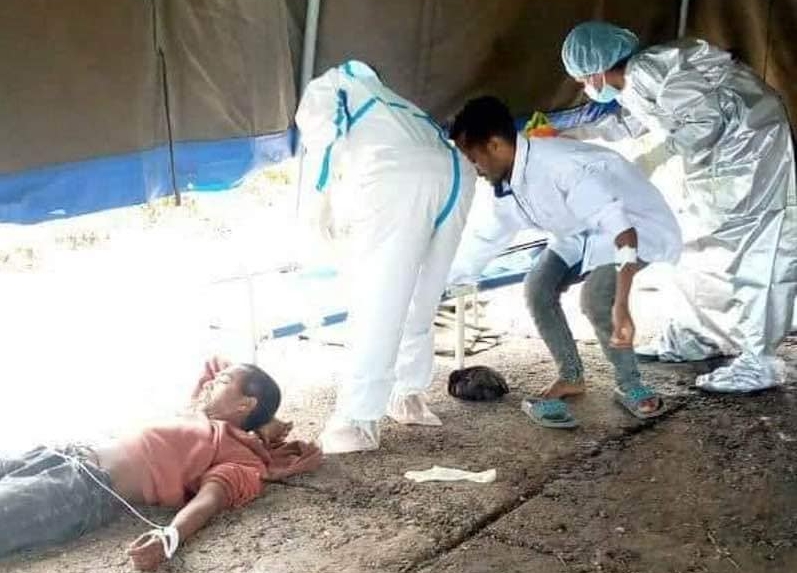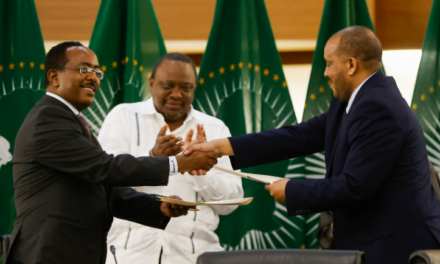By Abebe Gellaw
EVN (Sept 14) — Disturbing images leaked from the Tulu Dimtu concentration camp, located in Ethiopia’s Oromia Region, have ignited widespread outrage on social media. Tens of thousands of ethnic Amhara individuals, detained without trial and held incommunicado, are alleged to be enduring dire conditions and suffering from rampant pneumonia and cholera outbreaks.
The images depict victims in distressing conditions, alongside medical personnel wearing full pandemic masks.
Amhara activists have voiced grave concerns about the treatment of detainees, asserting that the victims are subjected to inhumane conditions reminiscent of the treatment of Jews during the early days of Nazi atrocities. Their plea for global attention and intervention has resonated widely, with calls to end this injustice reverberating across social media platforms.
Tulu Dimtu, situated just a few kilometers from the capital city of Addis Ababa, has quickly become a symbol of the Amhara people’s anguish. According to a healthcare professional familiar with the situation, the toll of infectious diseases and starvation within the camp has led to the tragic fatalities of more than 350 Amharas. A healthcare provider, who spoke on condition of anonymity, was quoted as emotionally describing this period as “the darkest chapter in my life.”
The concentration camp in Tulu Dimtu remains deeply unsettling, as those of Amhara descent endure the ravages of a pneumonia outbreak amid allegations of gross human rights violations, without any legal grounds. The situation, captured in the leaked images, underscores the pressing need for humanitarian intervention on a global scale.
Andargachew Tsigie, the former opposition leader who had once collaborated with Prime Minister Abiy Ahmed’s failed reform agenda, has strongly condemned the treatment of Amhara individuals facing dire circumstances in these concentration camps. In a Facebook post attributed to him condemned the atrocities.
The Fano insurrection in the Amhara region, which was triggered by the decision of the federal government to completely disarm Amhara militias despite the security threats the region is facing, poses a significant threat to the Abiy regime. The Prime Minister is accused of orchestrating crimes against humanity, including mass arrests and mass displacement of ethnic Amharas.
Andargachew also wrote in another post that ethnic Amharas, originating not only from other regions but also from different areas within the Amhara region, are being detained en masse in Bir Sheloko, Shawa Robit, and other locations. They suffer physical abuse and lack adequate food. Among the detainees are government employees, scholars from institutions like Addis Ababa University, Kotebe University, Addis Ababa University of Science and Technology Faculty, Debre Berhan University, Adama University, and Arsi University, as well as teachers from various schools in Addis Ababa. Moreover, individuals from diverse backgrounds, including affluent businesspeople, day laborers, journalists, activists, and members of political parties, including the Amhara National Movement and EZEMA, are held in concentration camps and police training facilities in Addis Ababa. These detainees are subjected to torture and human rights organizations have been denied access to many of the sites.
Reports indicate that ethnic Amhara individuals are facing similar fatal circumstances due to gross human rights violations, including starvation and the outbreak of epidemics, in concentration camps in Oromia’s Gelan concentration camp and other regions where pneumonia and cholera outbreaks are rampant. Activists on platforms such as Twitter and Facebook are urging the international community and human rights organizations to intervene and draw attention to the ongoing crimes and genocide against Amharas.
In a related development, an Emergency Inquiry Board has disclosed that only 764 detainees are currently held in five designated locations since the State of Emergency was declared a month ago. Azmera Andemew, the chairman of the Board, made this revelation during a press briefing, emphasizing that these detainees are held in conditions where their human rights are respected. The designated locations include Addis Ababa, Shewa Robit, Bahir Dar, Combolcha, and Gondar.
However, human rights groups have contested this official figure, with some estimating the number of mass detainees in Addis Ababa alone to be close to 60,000. This stark contrast highlights the ongoing discrepancies in reporting and raises concerns about transparency regarding detainment figures.
Two weeks ago, Dr. Daniel Bekele and four other staff members of the Ethiopian Human Rights Commission (EHRC) visited detainees in Awash Arba, a military camp that had been converted into a concentration camp. During this visit, Member of Parliament Christian Tadelle and Dr. Kassa Teshager, a member of the Addis Ababa City Council, among others, met with the EHRC group.
The visiting group questioned why the detainees were held in a military camp rather than a civilian detention facility. It was revealed that all federal prisons were operating at full capacity, further complicating the detention situation in Ethiopia. This revelation adds another layer of complexity to the ongoing crisis and calls for a comprehensive and transparent assessment of detainment conditions across the country.








